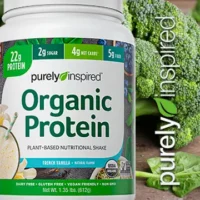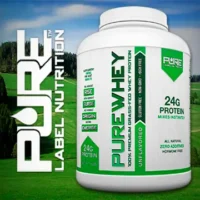BACK
How to bulk up with Protein Powder
How to bulk up with protein powders, an easy and convenient source of protein that won’t tip the scales in fat or carbs.

In the world of fitness, protein seems synonymous with bulking. But did you know that protein contains the same calories as carbohydrates?
That’s right. For every gram of protein or carbohydrate, you get exactly the same number of calories. So, why are proteins talked about so much more than carbs?
Firstly, good quality carbohydrates are easily come by. Rice, oats, potatoes, and fruits are all excellent sources of carbs and can be used to bulk up any meal. (See what we did there?) Protein is present in all those foods, but the foods highest in protein also tend to contain high sources of fat, such as meat, eggs, and nuts.
While plant proteins are a healthy option, the high fiber content can sometimes leave you full before you’ve managed to get all your daily calories in. Enter protein powders; an easy and convenient source of protein that won’t tip the scales in fat.
That’s right. For every gram of protein or carbohydrate, you get exactly the same number of calories. So, why are proteins talked about so much more than carbs?
Firstly, good quality carbohydrates are easily come by. Rice, oats, potatoes, and fruits are all excellent sources of carbs and can be used to bulk up any meal. (See what we did there?) Protein is present in all those foods, but the foods highest in protein also tend to contain high sources of fat, such as meat, eggs, and nuts.
While plant proteins are a healthy option, the high fiber content can sometimes leave you full before you’ve managed to get all your daily calories in. Enter protein powders; an easy and convenient source of protein that won’t tip the scales in fat.
HOW MUCH PROTEIN DO I NEED TO BULK?
The basic standard set by the World Health Organization is around 10 - 15% of your overall diet, or 0.36g per pound of body weight. For an athlete or someone partaking in a high protein diet, that may increase to 20%.
Many recommendations in the fitness industry are between 20-25% of your overall caloric intake. This works out to be around 0.8 - 1g of protein per pound of body weight. So, if you weigh in at 100 pounds, your top intake of protein will work out as 100g of protein, which is equal to around 400 calories.
Put simply:
Many recommendations in the fitness industry are between 20-25% of your overall caloric intake. This works out to be around 0.8 - 1g of protein per pound of body weight. So, if you weigh in at 100 pounds, your top intake of protein will work out as 100g of protein, which is equal to around 400 calories.
Put simply:
Body Weight (pounds) x 0.8-1.0grams = Daily Protein Intake
You can multiply the daily protein intake figure by 4 to get your calorie count for that protein intake.
You’ll need to make up the remaining 75% of your calories in carbohydrates and fat. Carbs should be the largest percentage of what you’re eating, and although fat does help to increase weight, it’s not always the healthiest option, so don’t go too crazy on the pepperoni pizza.
When bulking, you’ll need to increase your dietary intake by around 10%. This means that your usual intake of 100g of protein (assuming you’re a 100-pound person) will increase too. However, it won’t increase by the full 10%, as you’ll be making most of that up with carbohydrates and some healthy fats.
A calorie tracking app such as My Fitness Pal or Cronometer can be useful for working this all out, and you can manually set your calorie intake in percentage form.
You’ll need to make up the remaining 75% of your calories in carbohydrates and fat. Carbs should be the largest percentage of what you’re eating, and although fat does help to increase weight, it’s not always the healthiest option, so don’t go too crazy on the pepperoni pizza.
When bulking, you’ll need to increase your dietary intake by around 10%. This means that your usual intake of 100g of protein (assuming you’re a 100-pound person) will increase too. However, it won’t increase by the full 10%, as you’ll be making most of that up with carbohydrates and some healthy fats.
A calorie tracking app such as My Fitness Pal or Cronometer can be useful for working this all out, and you can manually set your calorie intake in percentage form.
HOW TO USE PROTEIN POWDERS?
So, you’ve worked out how much protein you need per day, and you’ve realized it’s a bit higher than you expected! Reaching 10-15% protein on a whole-food diet is quite easy, but beyond that, you’re either looking at huge quantities of carbohydrates, or high levels of fat.
Nobody wants the discomfort of eating such huge quantities of food, so a protein powder can be taken in addition to your regular diet.
There’s a lot of conflicting data on how to best take protein. Some guides recommend drinking a shake within 20 minutes of completing your workout, to maximize protein uptake when your body needs it the most. We tend to agree with this and recommend taking your protein supplement directly after a workout. Others suggest taking your protein before a workout, believing that it will provide energy for the exercise you’re about to do. This can help with endurance, though we recommend at least an hour before your workout to prevent cramping. Another idea is to drink your protein shake before bed, as your body does its best repair work while you sleep. This is especially the case when using casein which helps prevent muscle cell breakdown while you rest.
As everybody is different, we don’t believe there is a one-size-fits-all answer. However, it is a great idea to take your shake once or twice a day, at a time that’s most convenient for you.
We do suggest drinking it in between meals, as the body can only absorb a certain amount of protein at a time. If you’re eating a high-protein meal at lunch, try using your shake as an afternoon tea, giving your body some time to digest in between. You can even blend your protein powder with some frozen bananas and make a healthy, bulk-friendly ice-cream dessert!
What’s most important is that you:
Nobody wants the discomfort of eating such huge quantities of food, so a protein powder can be taken in addition to your regular diet.
There’s a lot of conflicting data on how to best take protein. Some guides recommend drinking a shake within 20 minutes of completing your workout, to maximize protein uptake when your body needs it the most. We tend to agree with this and recommend taking your protein supplement directly after a workout. Others suggest taking your protein before a workout, believing that it will provide energy for the exercise you’re about to do. This can help with endurance, though we recommend at least an hour before your workout to prevent cramping. Another idea is to drink your protein shake before bed, as your body does its best repair work while you sleep. This is especially the case when using casein which helps prevent muscle cell breakdown while you rest.
As everybody is different, we don’t believe there is a one-size-fits-all answer. However, it is a great idea to take your shake once or twice a day, at a time that’s most convenient for you.
We do suggest drinking it in between meals, as the body can only absorb a certain amount of protein at a time. If you’re eating a high-protein meal at lunch, try using your shake as an afternoon tea, giving your body some time to digest in between. You can even blend your protein powder with some frozen bananas and make a healthy, bulk-friendly ice-cream dessert!
What’s most important is that you:
- Use your protein as a supplement to a healthy diet
- Drink it in between meals, not with them
- Choose a protein powder that suits your needs
WHAT ABOUT BULKING PROTEINS?
There are a number of protein powders on the market which contain additional carbohydrates and starches. Often known as mass or gainer proteins, these can be a great option for increasing both carbs and proteins together. This is especially important for elite athletes that have trouble getting a high enough calorie intake to maintain body mass.
Many of these proteins can be used in baking as well as in shakes, and it’s worth trawling the internet for protein black bean brownies or high-protein oats.
As always, we recommend checking the ingredients to make sure you’re getting a good quality supplement.
Many of these proteins can be used in baking as well as in shakes, and it’s worth trawling the internet for protein black bean brownies or high-protein oats.
As always, we recommend checking the ingredients to make sure you’re getting a good quality supplement.
THE BOTTOM LINE
Protein powders can be a very convenient way to ensure you meet your calorie needs, especially for those who are bulking. Used in addition to a well-planned diet, they can make gains so much easier.
Choose a protein that fits your dietary needs and watch those gains!
Choose a protein that fits your dietary needs and watch those gains!
Popular Reviews
The content on this site has not been written, reviewed or endorsed by a medical professional. We assume no liability for the misuse of supplements and recommend you review the label of any product, as well as consulting with your health care professional.
We are a participant in the Amazon Services LLC Associates Program, an affiliate advertising program designed to provide a means for us to earn fees by linking to Amazon.com and affiliated sites.
We are a participant in the Amazon Services LLC Associates Program, an affiliate advertising program designed to provide a means for us to earn fees by linking to Amazon.com and affiliated sites.
© 2025 ProteinPowder.com




